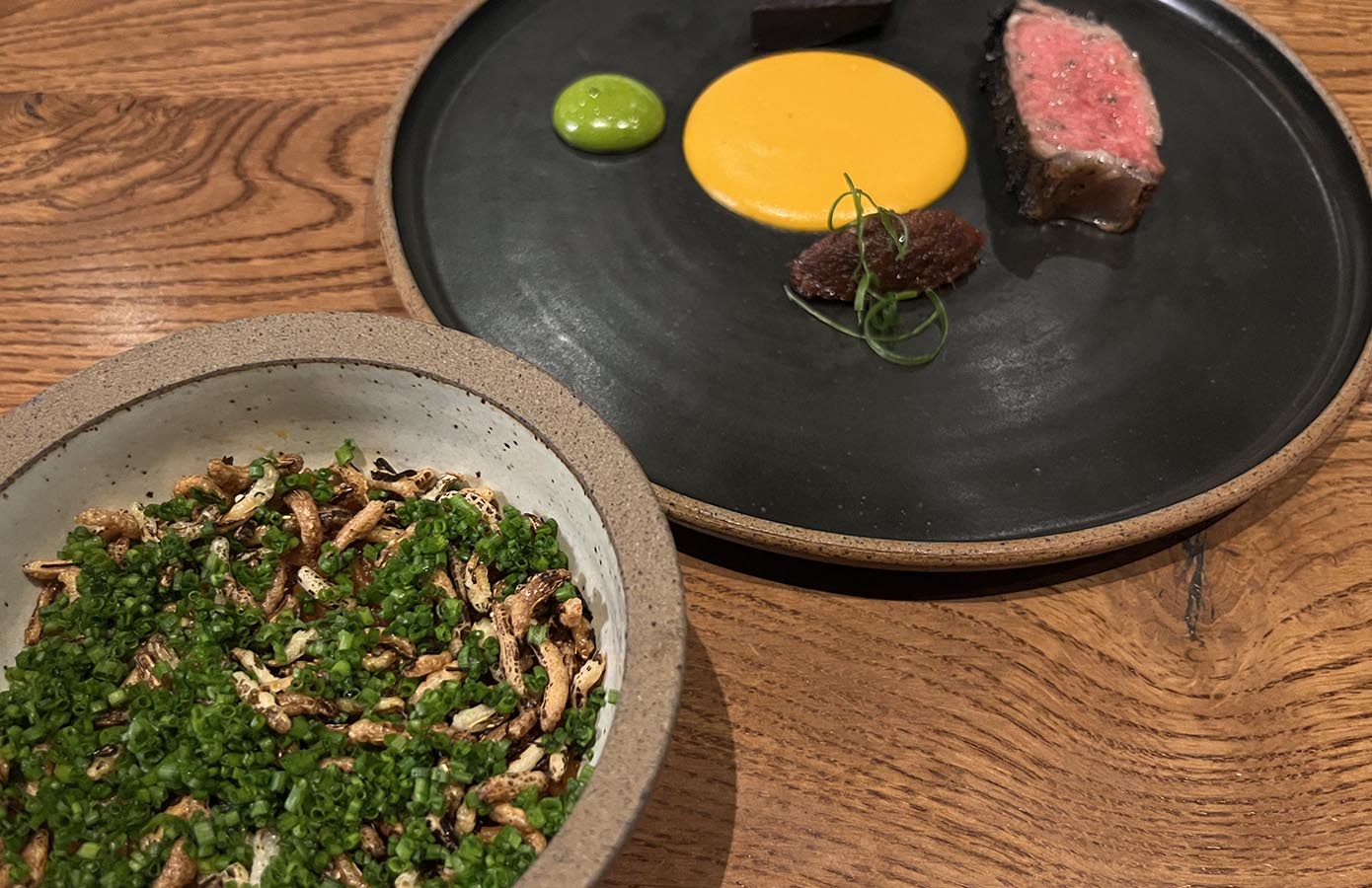
The delicious and surprising jollof rice with Heresford beef, Shito XO and purple carrot. Photo: Olive Vassell.
African restaurants enjoy Michelin stars
BY OLIVE VASSELL
The savory flavours of Africa’s diverse foods have always attracted me. You see my palate was trained on the vibrant dishes of the Caribbean, themselves “children” of the continent, transported to the islands by Africans during enslavement.
They brought with them their own culinary traditions which they applied to the new ingredients and conditions they encountered. Staples like plantains, yams, okra, were fused with indigenous and European influences to create a mouthwatering melting culinary pot, but the connection to Africa remained the most profound.
It was this connection that fuelled my curiosity when I sat down for dinner at Akoko, one of London’s two African Michelin star restaurants. Its selection was easy thanks to flexible options which meant that my friend, a meat-eater of West African origin and I, a vegan, with Caribbean heritage, could share what we hoped would be an extraordinary, culinary experience.
It is clear that providing just that is at the core of the restaurant’s philosophy. Launched in October 2020 by restaurateur Aji Akokomi, it is located in the heart of Fitzrovia and you are immersed in Africa as soon as you walk through the door. This interpretation is dominated by earthy tones and wooden furnishings, presumably to provide a soothing backdrop for the true star – the food. My friend and I wondered, however, whether more colour would have better evoked the continent’s vitality as well as the culinary delights to come.
And, we could see exactly what was ahead. Standing front and center in the open kitchen was Akoko’s chef Ayo Adeyemi. Born in Scotland of Nigerian heritage, his early culinary inspiration was his mum who was renowned for her jollof rice. Working in restaurants across the world, in America in particular, Adeyemi dreamt of melding flavours across the African diaspora; those fusions are now at the heart of the restaurant’s cuisine.
This unique melange was explained to us by a team of waiting staff who were attentive, knowledgeable, and clearly passionate about the food they were serving. We were “briefed” in great detail about each of the eight dishes on the dinner menu. When we reached the Jollof rice course and were presented with a book introducing the dish, my friend couldn’t resist a quick banter with the waiter about which would be served, Ghanaian or Nigerian Jollof? – a reference to the friendly rivalry between the two countries.
The offerings worked well for us both, despite the dietary differences. My vegan options included Nigeria’s Efo Riro – king oyster mushroom on a bed of pureed spinach, which was brought to the table along with my friend’s Ayamase. A Nigerian stew made with unripe pepper, beans, onions, meat, eggs and palm oil, it was coupled with Monkfish and Vatapá, an Afro-Brazilian- staple made of bread, shrimp, coconut milk, peanuts and palm oil. We both agreed that the Gambian Stew made with onions, chili, pepper paste and more, had won our hearts. My friend’s was served with an Irish oyster and Tatase (Nigerian red pepper) relish and mine with potato replacing the oyster. Also appreciated was the much celebrated Jollof rice, mentioned above, which included a delightful surprise – a scattering of popped jasmine rice.
We were all in, drink-wise too. I sampled Nigeria’s Eko beer, which was pleasant and light. My friend meanwhile opted for the Palm punch, which she found tasty if a little sweet.
And while we had initially worried that we would still be hungry after the meal, by the end of it we were joking about needing a good walk. We had earlier realised that eating at Akoko was more than just having a meal and worth the £120 price tag. My friend described the experience as a performance, like going to the theatre or a concert, and I happily admit that I totally agree.
To discover the other Michelin Star eatery Chishuru and meet its visionary founder Joké Bakare, watch the video below.
Enter the world of African gastronomy with Chishuru, a culinary gem that tantalizes taste buds and showcases the diversity of flavors embedded in the continent’s rich food culture. Originating from Nigeria, Chishuru represents a fusion of traditional ingredients and contemporary flair, making it a standout in the global culinary scene.
At its essence, Chishuru is a celebration of fresh, seasonal produce, often featuring a vibrant medley of vegetables such as leafy greens, tomatoes, and okra. The dish is elevated with a harmonious blend of spices, reflecting the depth and complexity that characterize African cuisine.
One of Chishuru’s distinctive qualities is its versatility. Whether served as a vegan delight or accompanied by succulent meats, the dish adapts to various preferences and dietary choices. The result is a symphony of flavors that captivates diners and introduces them to the authentic tastes of Africa.
Chishuru’s journey from local tradition to international recognition mirrors the global appreciation for diverse and bold culinary experiences. As food enthusiasts seek new and exciting flavors, Chishuru takes its place as a flavorful ambassador, inviting everyone to savor the richness and complexity of African cuisine. In a world that celebrates culinary diversity, Chishuru stands out as a testament to the incredible tapestry of flavors waiting to be explored and enjoyed.








